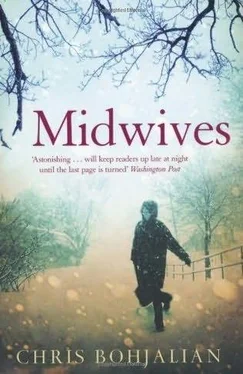Chris Bohjalian - Midwives
Здесь есть возможность читать онлайн «Chris Bohjalian - Midwives» весь текст электронной книги совершенно бесплатно (целиком полную версию без сокращений). В некоторых случаях можно слушать аудио, скачать через торрент в формате fb2 и присутствует краткое содержание. Жанр: Современная проза, на английском языке. Описание произведения, (предисловие) а так же отзывы посетителей доступны на портале библиотеки ЛибКат.
- Название:Midwives
- Автор:
- Жанр:
- Год:неизвестен
- ISBN:нет данных
- Рейтинг книги:5 / 5. Голосов: 1
-
Избранное:Добавить в избранное
- Отзывы:
-
Ваша оценка:
- 100
- 1
- 2
- 3
- 4
- 5
Midwives: краткое содержание, описание и аннотация
Предлагаем к чтению аннотацию, описание, краткое содержание или предисловие (зависит от того, что написал сам автор книги «Midwives»). Если вы не нашли необходимую информацию о книге — напишите в комментариях, мы постараемся отыскать её.
Midwives — читать онлайн бесплатно полную книгу (весь текст) целиком
Ниже представлен текст книги, разбитый по страницам. Система сохранения места последней прочитанной страницы, позволяет с удобством читать онлайн бесплатно книгу «Midwives», без необходимости каждый раз заново искать на чём Вы остановились. Поставьте закладку, и сможете в любой момент перейти на страницу, на которой закончили чтение.
Интервал:
Закладка:
"About twenty-five hundred."
"Do most nurse-midwives deliver babies at home?"
"Oh, no, just the opposite's true. The vast, vast majority of us work in hospitals or birthing centers-almost ninety-five percent of us."
"What about you?"
"I have delivered babies at home, but I haven't since I was much younger. I prefer birthing rooms in hospitals."
"Why did you stop delivering babies at home?"
"In my opinion, it's needlessly risky."
"Did you have a bad experience?"
"Thank God, I didn't."
"What made you think it was dangerous?"
"Education. The more I learned about obstetrics, the more I realized that allowing a woman to have a baby at home exposed everyone-mother and infant-to completely unnecessary hazards."
…
"You said roughly ninety-five percent of nurse-midwives work in hospitals and birthing centers. So that means roughly five percent don't?" Stephen asked Kimberly Martin.
"Yes."
"That five percent: Do they work in homes?"
"Yes."
"Do they have a higher infant mortality rate than the rest of the group?"
"No, they don't."
"About the same?"
"The numbers are small, so it's hard to make a statistical comparison."
"Bearing in mind the numbers are small: About the same?"
"Yes."
"How about maternal mortality? Do you see a greater incidence of maternal mortality among midwives delivering babies at home?"
"No."
"In fact, did any nurse-midwife in your organization see any woman die in home childbirth last year?"
"I don't think so. But that doesn't diminish-"
"In fact, none died, Miss Martin," Stephen said, cutting the woman off before she could elaborate on her answer. "Did you know Bell Weber?" he then asked.
"I did."
"Would you tell us who she was?"
"She was a nurse-midwife. She died this summer in a car accident."
"Did she deliver babies at home?"
Martin nodded. "In Maryland."
"Was she a member of your group?"
"Until she died."
"Was she on the Division of Accreditation with you?"
"Yes."
"Was she on any other committees for the American College of Nurse-Midwives?"
"She was chairing the home birth committee."
"Your organization has a home birth committee? Really?"
The midwife looked annoyed with Stephen, disgusted at the flippant way he'd asked the question. "Obviously we have such a committee."
"Is that because some midwives in your group still choose to practice there?"
"Yes."
Stephen nodded. "Does the American College of Nurse-Midwives formally oppose home birth?"
"No."
"Thank you."
Kimberly Martin was followed by another woman who had once caught babies in people's bedrooms, and then, apparently, decided this wasn't a particularly good idea. A few minutes after she began answering Bill Tanner's questions, I must have looked worried or nervous, because Patty Dunlevy turned to me and whispered that we had experts, too, and ours would be every bit as impressive as these people.
But that afternoon it was hard for me to believe we'd have anyone as accomplished as Dr. Jean Gerson. Thirty years earlier Jean had been a young midwife delivering babies at home; now she was an ob-gyn affiliated with a teaching hospital in Boston, a faculty member at Boston University's School of Medicine, and the author of two books on prenatal care.
She had also written extensively about the history of birth in America. It was she who reminded us early in her testimony that while labor is natural, it's dangerous: "Let's face it," she had added, "there was a time when women and babies died all the time in labor."
Dr. Gerson had reviewed the medical history Charlotte Bedford had supplied my mother the summer Veil was conceived, and she had examined the records my mother had kept, charting the woman's progress. And she told the jury that no responsible person, doctor or midwife, would have allowed Charlotte Bedford to labor at home. It was clear based on her first labor that she was a poor candidate for home birth, and it was evident during the pregnancy that she was too frail for the ordeal. She wasn't gaining enough weight, and she was anemic.
Moreover, Dr. Gerson was positively telegenic. She was a handsome, dignified woman who smiled when she spoke, the sort of person who was instantly likable at even the sort of distance-figurative as well as literal-that separated defense and prosecution tables in a courtroom. Years later when I was in medical school, I would recall her face and her voice, and I would find myself wishing I had gone to B.U.
Ironically, a part of my mother's defense was the fact that Charlotte was indeed an imperfect candidate for a home birth, but not because she was anemic: Stephen planned on making an issue of the fact that Charlotte had been treated for hypertension in Alabama but had never shared this information with my mother. And so when he stood to begin his cross-examination of Dr. Gerson at the end of the day, the sun so far to the west that the courtroom was lit almost solely by the big chandelier and the sconces along the walls, we all expected the two would have a brief and perfunctory conversation.
"Are many pregnant women anemic?" Stephen asked her, and I was surprised by the energy that still filled his voice. It may have been because I had been up so late the night before, and it may have been due to the stress, but I was exhausted. I couldn't imagine where Stephen got his strength.
"I wouldn't say many are 'anemic,' but I would say that many experience some small degree of anemia," she answered.
"Why is that?"
"When a woman is pregnant, her blood volume increases. Sometimes it increases by as much as half. And so there's a natural dilution, and a natural anemia."
"Is it treatable?"
"Yes."
"How?"
A newborn baby in the back of the courtroom started to whine and fuss, and I heard the sound of the long zipper on the front of his mother's dress. I saw many of the jurors glance reflexively in the woman's direction, and then Judge Dorset looked that way, too. Almost instantly all of the men turned away when they saw the woman place the nipple on her full breast into the infant's mouth, deciding to stare intently at Stephen or the doctor instead.
"Iron tablets. Ferrous sulfate, usually."
"Any side effects?"
"Indigestion sometimes. Often constipation."
"You said you've reviewed how Sibyl treated Charlotte Bedford's anemia, correct?" Stephen asked.
"That's right."
"What did Sibyl do?"
"She had her take iron tablets."
"Did her condition improve?"
"Not enough to merit-"
"Did Charlotte Bedford's condition improve?"
Dr. Gerson offered a broad smile that suggested to me-and I have to imagine to the jury as well-that she wouldn't stoop to Stephen's level of discourtesy and debate. If he wanted to interrupt her and cut her off, her smile said, fine. It made no difference to her.
"Yes," she said.
Stephen asked the court officer who was standing beside the rolling cart upon which Bill Tanner was piling his evidence for the medical records the State had just entered. He then handed the physician two sheets of paper lined with boxes and graphs.
"Do you recognize these?"
"They're the records your midwife kept of the deceased."
"These are the records you examined?"
"A part of them, yes."
"What are their dates?"
She adjusted her eyeglasses slightly and then answered, "One is from September fifteenth, 1980, and one is from February twelfth, 1981."
"I want to focus on the hematocrit values," Stephen said, referring to the term the medical community uses to describe the percentage of blood occupied by red corpuscles. All of us in the courtroom had learned the term during the first part of Dr. Gerson's testimony. "What was Charlotte Bedford's hematocrit value in September?"
Читать дальшеИнтервал:
Закладка:
Похожие книги на «Midwives»
Представляем Вашему вниманию похожие книги на «Midwives» списком для выбора. Мы отобрали схожую по названию и смыслу литературу в надежде предоставить читателям больше вариантов отыскать новые, интересные, ещё непрочитанные произведения.
Обсуждение, отзывы о книге «Midwives» и просто собственные мнения читателей. Оставьте ваши комментарии, напишите, что Вы думаете о произведении, его смысле или главных героях. Укажите что конкретно понравилось, а что нет, и почему Вы так считаете.











